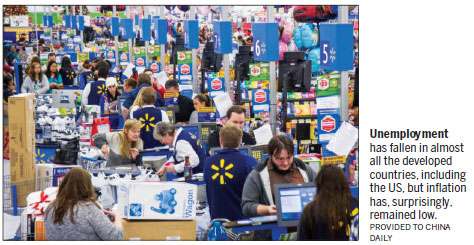Warning for investors - cheap credit may soon be over
Updated: 2017-10-20 06:17
(HK Edition)
|
|||||||||
The US economy has been growing at a brisk pace for almost a year, creating enough new jobs to push the unemployment rate to its lowest level since the outbreak of the credit crisis in 2008.
The European Union's economy has also found a firm footing, while the Japanese economy is showing signs of sustainable health after a period of seesawing between anemic progress and outright recession.
The latest developments in the global economy should be closely watched in Hong Kong, whose externally-oriented economy is particularly sensitive to changes in prices of capital and goods. Instead of indulging in the eerie sense of security, investors need to be aware that the asset-price inflation, or bubble, can be short-circuited by a sudden contraction of liquidity, accompanied by rising borrowing costs.
The warning signs have become increasingly apparent. Despite the fall in unemployment in nearly all the developed economies, inflation has remained surprisingly low. But, with the demand for workers picking up in the US and the major EU economies, including Germany and the United Kingdom, economic planners are expecting a rise in average wages.
When wages start rising, can inflation be far behind? The world's top central bankers predict that inflation will not stay at its current low level for much longer, according to a Bloomberg report. Federal Reserve Chair Janet Yellen has said she expects consumer prices to accelerate soon.
Her "best guess", as she put it, on prices was shared by some of the top central bankers, including European Central Bank President Mario Draghi and Bank of England Governor Mark Carney at the International Monetary Fund's annual meetings last weekend in Washington.
Yellen reiterated that the strength of the US economy will "warrant gradual increases" in interest rates. Indeed, the market has been expecting the Fed to hike rates at its next policy meeting in December.
Bloomberg reported that Draghi had said he's "confident" that the inflation rate will soon surge from the 1.5 percent recorded in September. He's widely expected to reveal a bond-buying plan later this month, signifying an end to the loose monetary policy that has been in place since the Great Recession.
Earlier this month, the Hong Kong Monetary Authority -the city's de facto central bank - initiated a program to reduce excessive liquidity in the banking system with the aim of facilitating a steady and progressive increase in interest rates. It should also signal that the flush of cheap credit into the asset market may be coming to an end sooner than investors have expected.

(HK Edition 10/20/2017 page19)